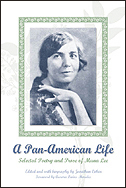Biography / Literature / Poetry / Latin America / Women's Studies
|
A
Pan-American Life "A poet who is also a sound scholar,
a mistress of tongues, and a profound believer in a cause is
a rare and wonderful thing. Muna Lee is all four."—Archibald MacLeish, in The American Story The extraordinary Muna Lee was a brilliant writer, lyric poet, translator, diplomat, feminist and rights activist, and, above all, a Pan-Americanist. During the twentieth century, she helped shape the literary and social landscapes of the Americas. This is the first biography of her remarkable life and a collection of her diverse writings, which embody her vision of Pan America, an old concept that remains meaningful today. "Jonathan Cohen has given us the exquisite
gift of recognition: the life of Muna Lee—a poet, essayist,
human rights activist, and indeed a visionary and fervent Pan-Americanist.
Through Cohen's insightful and original biography, readers will
get to know, as well as love, the spirit of Muna Lee, one of
the most extraordinary and creative figures of the twentieth
century, a builder of bridges and hopes. Cohen's work will not
allow us to forget her. More so, it rescues her from the invisibility
of her work and life. A magnificent tribute to a magnificent
woman."—Marjorie Agosín, author of A Map
of Hope: Women's Writing on Human Rights Muna Lee (1895–1965), a native of Mississippi and Oklahoma, was married for a time to Luis Muñoz Marín, Puerto Rico's first elected governor. She then worked for the U.S. Department of State for decades. Jonathan Cohen is a translator and writer at Stony Brook University. Media & bookseller inquiries regarding review copies, events, and interviews can be directed to the publicity department at publicity@uwpress.wisc.edu or (608) 263-0734. (If you want to examine a book for possible course use, please see our Course Books page. If you want to examine a book for possible rights licensing, please see Rights & Permissions.) More about Muna Lee A Mississippian or Oklahoman or Puerto Rican, depending on one's point of view, Muna Lee started her writing career as a celebrated lyric poet. As a translator and advocate of Latin American literature, she made major contributions to the modern Pan-American literary tradition. Moreover, as a leading feminist in the twenties and thirties, she made important contributions to the modern women's movement, in particular the struggle for equal rights; she was an active member of the National Woman's Party and a founding member of the Inter-American Commission of Women. Lee's work as an inter-American cultural affairs specialist for the U.S. State Department (1941–1965) required her to confer daily with ambassadors and ministers of Latin American countries, arranging for exchange of literature, art, and films. She was instrumental in persuading artists and writers (Faulkner among them) to go abroad as goodwill ambassadors for the United States, and she was a valued counselor at all levels in the State Department on matters related to Latin America. Her Pan-Americanism formed the basis of her commitment to the cultural approach to international relations worldwide. During the Second World War, William Carlos Williams told Lee in response to her translations of Ecuador's premier poet, Jorge Carrera Andrade: "I don't know when I have had so clear a pleasure, so unaffected by the torments of mind which are today our daily bread. The images are […] so extraordinarily clear, so related to the primitive that I think I am seeing as an aborigine saw and sharing that lost view of the world. It's a sad pleasure but a great one. […] We all need to know each other better, we need it badly. We need it more than anything else in the world." Lee was the first wife (1919–1946) of Luis Muñoz Marín, who was a bohemian poet and journalist in his youth when she married him, and who later became Puerto Rico's first elected governor. Her influence on his development as a political leader contributed much to his achievements, and to his legacy as the founder of the Commonwealth of Puerto Rico. Her life embraced Puerto Rico as a consequence of their passionate love and their family. From 1920 to her death in 1965, it was her legal residence—and what she lovingly called her "rich port." |
Cloth OUT OF PRINT To order, you can accumulate titles in the Shopping Cart by clicking on the bulleted lines below. You can submit your order electronically, paying for it with MasterCard or Visa. Click here for further explanation of shopping cart feature. Never
ordered from us before? |
|
|
|
|
